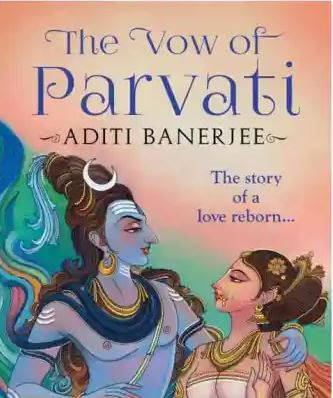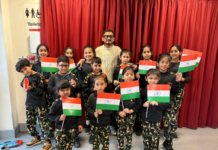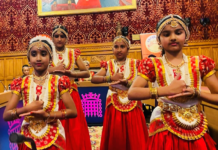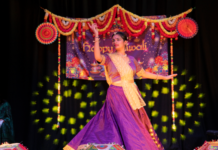 Aditi Banerjee’s The Vow of Parvati, published by Bloomsbury India in April 2022 is a story of Devi Sati/Parvati and how she transformed from a beautiful, gentle, powerful yet shy Devi unaware of her own strength into the Devi we revere and worship today through her relationship with and love for Shiva and her family. Speaking to OpIndia, Banerjee said, “Devi encompasses all aspects of the female form, from the child to the crone, from the gentle to the fierce, from the scholar to the warrior. And in a sense we can see them all emanating from Sati / Parvati.”
Aditi Banerjee’s The Vow of Parvati, published by Bloomsbury India in April 2022 is a story of Devi Sati/Parvati and how she transformed from a beautiful, gentle, powerful yet shy Devi unaware of her own strength into the Devi we revere and worship today through her relationship with and love for Shiva and her family. Speaking to OpIndia, Banerjee said, “Devi encompasses all aspects of the female form, from the child to the crone, from the gentle to the fierce, from the scholar to the warrior. And in a sense we can see them all emanating from Sati / Parvati.”
Author Aditi Banerjee talks about why books with strong female protagonist are getting readers interested
She further said, “In her resides the one who gave up her life for Shiva, who fasted and underwent all kinds of austerities to win his favour, as well as the one who sits on the jewelled throne, supported by Shiva and all of the Devas, who carries a weapon forged from the strength of all of the other Devas combined. She is Shakti, the energy that pervades the cosmos and all of existence, and she is also the one who delights Shiva, the eternal renunciate. She and Shiva form the ideal couple, because in their union, they retain their independent roles and existence while also merging into a seamless oneness and wholeness, which represents the completeness of Brahman.”
On whether she considers her story on Devi Parvati a fiction or mythological fiction, Banerjee said, “It is unfortunate that we are trapped by English categorizations that do not map onto Indic / Hindu classifications or frameworks. Mythology / fiction vs. nonfiction in the West is basically distinguishing what is or may be historical fact from that which is ‘made up’. ‘Mythology’ is used to characterize non-Western traditions and faiths as false.”
“That said, there is a thirst for literature inspired by the Itihaasa and Puranas and also from ancient Greek, Norse, and other pagan epics. As the modern world has become divorced from its ancient civilizational heritage, there is now an emerging desire to reconnect with our roots and to delve into the ancient epics. The epics do not exist just for storytelling or to transmit religious beliefs. They encode lessons about human nature, the nature of the world, the meaning and purpose of life, and all throughout history, people studied the Classics to develop a greater appreciation and understanding of the mystery of life. So, it is natural to want to reengage with tales that have stood the test of time and place, that have become part of our cultural DNA. At the same time, many of us find the original texts to be inaccessible or daunting. So, this kind of literature serves as a gateway by retelling those stories in a syntax and format that is more familiar and easier to digest for a modern audience. In time, hopefully people will be inspired to read the original texts, whether in Sanskrit or in translation,” she said.
(By: Nirwa Mehta @ OPindia)

Readers like you, make ESHADOOT work possible. We need your support to deliver quality and positive news about India and Indian diaspora - and to keep it open for everyone. Your support is essential to continue our efforts. Every contribution, however big or small, is so valuable for our future.











